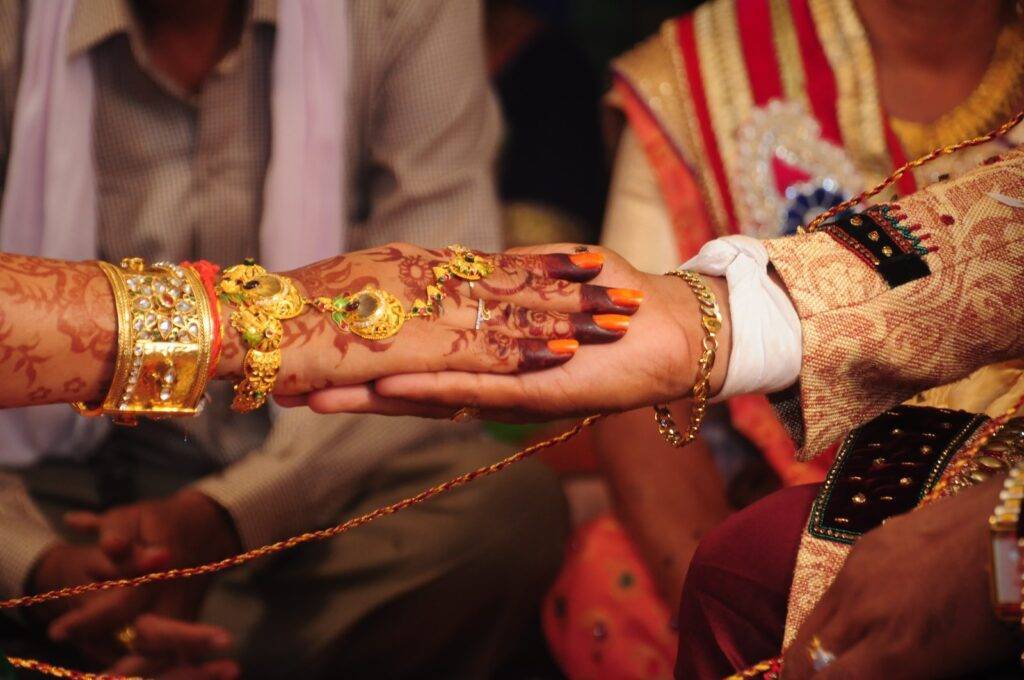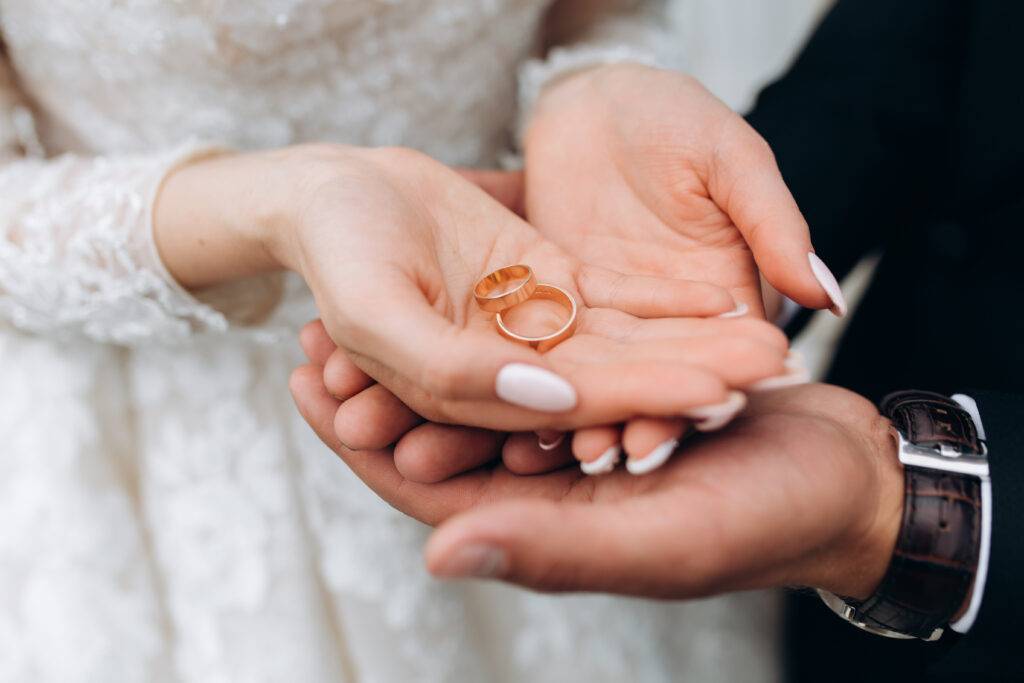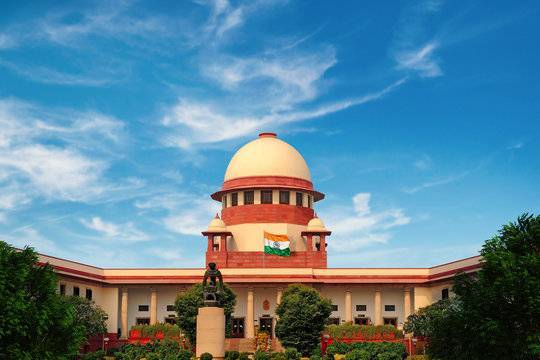
GAG LAWYERS -
GROVER & GROVER ADVOCATES

GAG LAWYERS -
GROVER & GROVER ADVOCATES

Court Marriage Lawyer, A court marriage in India is a civil marriage conducted by a court of law. This type of marriage is conducted under the Special Marriage Act, 1954. Under this act, a couple who wishes to get married can apply for a court marriage. The court will then process their application, and if all conditions are met, the court will issue a marriage certificate.
The couple must be at least 21 years of age and not related to each other. Both must be of sound mind and be able to give their consent to the marriage. The couple must also give a notice of intention to marry to the Marriage Officer of the district, along with supporting documents such as age proof, address proof, and identity proof. After the notice is given, the marriage officer will publish the notice in the prescribed manner and allow 30 days for objections to be raised. If no objection is raised within 30 days, the marriage officer will issue a marriage certificate to the couple. This certificate will be valid for six months and must be registered at the marriage registration office.
Court marriage in India is considered to be the most secure and legal way to get married. The court marriage procedure is undertaken in the presence of a judge or an authorized marriage officer. The marriage is registered in court, and the couple is provided with a valid marriage certificate. This certificate is proof of the couple’s marriage and can be used for various legal purposes.
Court marriage in India is a good option for those couples who do not wish to have a traditional wedding. This type of marriage is secure, legal, and less expensive. Furthermore, it is also much more convenient and can be done without involving any intermediaries. This makes it an attractive option for couples who wish to get married without any hassle.

Court marriage in India is the process of solemnizing a marriage between two individuals in the presence of a court. It is an elaborate procedure that is regulated by the 1954 Special Marriage Act. It is an alternative to traditional religious wedding ceremonies. A court marriage in India is also known as a civil marriage.
Court marriage in India is open to all religions, castes, and creeds. It is an ideal option for couples who come from different religions, castes, and backgrounds. It is also a popular option among couples who do not want to be restricted by the customs and rituals associated with traditional religious wedding ceremonies.
Court Marriage Lawyer_Grover & Grover Advocates
The process of court marriage in India is regulated by the Special Marriage Act, 1954. This act defines the types of court marriages and sets out the rules and regulations that need to be followed. It provides for a minimum age of 18 for the bride and 21 for the groom. It also sets out the documents that need to be presented to the court.
The court marriage process in India involves filing a Notice of Intended Marriage with the Marriage Officer in the district where either of the couple resides. After the notice is filed, it is then published in the office of the marriage officer. The marriage can be solemnized after the 30-day period of publication of the notice.
The court marriage process in India also involves the execution of a marriage certificate. This certificate is issued by the marriage officer and is signed by the bride, groom, and three witnesses. It is a legal proof of the marriage and is also used to register the marriage with the Registrar of Marriages. The marriage certificate serves as evidence of the marriage in the eyes of the law.

According to the Special Marriage Act, 1954, court marriage in India is a legally recognized union of two people. A court marriage is a civil contract between two individuals that is registered under the law. The parties involved in the marriage can be of different religions, castes, and countries. Both parties must be at least 21 years of age and willing to enter into a lifelong contract of marriage. There are certain rights and obligations that are given under court marriage in India.
One of the rights given to couples getting married through court marriage in India is that they can choose to get married without any religious or traditional rituals. This is one of the main advantages of court marriage, as it does not involve any expensive rituals or ceremonies. The couple can choose to get married in a court of law or in a private ceremony. The legal terms and conditions that are involved in court marriage must be followed in order for it to be legally binding.
Another right that is given to couples getting married through court marriage in India is that they can choose to file for divorce. The court of law has the authority to grant a divorce if the marriage has irretrievably broken down. The court will consider all the facts and evidence that are presented by the couples and decide whether or not to grant the divorce. In some cases, the court may also order the couple to attend counseling sessions in order to work out the issues that have led to the breakdown of the marriage.
Along with the rights that are given to couples getting married through court marriage in India, there are also certain obligations that they must abide by. These obligations include the payment of a marriage registration fee, the filing of an affidavit to declare the couple’s intention to marry, the submission of proof of the couple’s identity, the registration of the marriage in the prescribed manner, and the signing of a marriage certificate. All these obligations must be fulfilled in order to make the marriage legal. In addition to the rights and obligations that are given to couples getting married through court marriage in India, the court also has the authority to make decisions on matters related to the marriage. For instance, the court can decide on matters related to the division of assets, custody of children, alimony, and spousal support. This is done in order to ensure that the rights of both parties are respected and protected. It is important to note that the court’s decision is binding and cannot be appealed.

Court marriages in India are officiated by a marriage registrar appointed by the state government. The procedure for court marriage in India is fairly straightforward. All couples need to do is fill out the required forms, produce relevant documents, pay the fee, and register the marriage. This process is often completed in a single day. It is important to note that a court marriage in India is a civil marriage and not a religious one.
The first step in the process of court marriage in India is to obtain a marriage registration form from the local marriage registrar’s office. This can be done either in person or online. The form will require the full name, address, contact number, age, and other relevant details of both the bride and groom. The couple will also need to provide proof of identity and address. This can be done through a valid passport, driving license, or any other government-issued photo identity card.
Once the forms are filled out, the couple will need to present the relevant documents to the marriage registrar. These documents include proof of date of birth, proof of address, proof of identity, a divorce decree, or a death certificate (in case either of the partners is widowed). The couple may also need to provide proof of their non-relationship if they are related to each other by blood or marriage.
Once the documents are verified, the marriage registrar will ask the couple to pay a fee. This fee may vary from state to state. After the fee is paid, the marriage registrar will issue a marriage certificate to the couple. This certificate is the legal proof of their marriage. The couple can then use this certificate to apply for a joint bank account, a passport, etc.
Finally, the court marriage in India is not valid until the couple completes their honeymoon. This is a mandatory period of seven days that the couple must spend together in order to make their marriage legally binding. During this time, the couple will be required to remain together and must not engage in any kind of public display of affection. After the honeymoon period is over, the marriage is officially registered, and the couple can start their lives together as a married couple.

In India, court marriage is a legal process that allows two people to get married without any religious ceremonies. It is a civil marriage that is solemnized by a court of law. To get married by way of a court marriage, certain documents are required by both parties.
The documents required for a court marriage in India are the age proofs of both parties, which can be in the form of a birth certificate or school leaving certificate. Both parties need to present a valid proof of their identity, such as a passport, driving license, voter ID card, or Aadhaar card.
The other document required for court marriage in India is the residence proof of both parties, which can be in the form of a passport, electricity bill, telephone bill, or ration card. Both parties need to furnish a written declaration that states that they are not related to each other by blood or marriage and that they are of sound mind.
In addition, both parties need to present the divorce decree if either of them is a divorcee. If either of the parties is a widow or widower, then the death certificate of the deceased spouse needs to be presented. Lastly, four passport-size photographs of both parties are required.
Once all the documents are in place, the court will issue a notice, which is to be published in a newspaper. This is done to ensure that there is no legal objection to the marriage. After the completion of the legal process, the court will issue a marriage certificate to both parties.

1. The role of lawyers in court marriages in India is essential. A court marriage is a solemnization of marriage under the Special Marriage Act, 1954. The Special Marriage Act lays down the procedure and formalities for solemnizing court marriages in India. It requires the presence of a lawyer to ensure that the marriage is conducted in accordance with the law.
2. The lawyer is required to help the couple understand the legal implications of the marriage. The lawyer will explain the legal requirements of a valid marriage, such as the age of both parties, their capacity to enter into the marriage, and the necessary documents that need to be filed with the court.
3. The lawyer will also help the couple prepare the legal documents necessary for the court marriage. These documents include an affidavit of marriage, an affidavit of marriage registration, a statement of particulars, and a copy of the marriage certificate.
4. During the court marriage, the lawyer will be present to answer any questions that the couple may have. The lawyer will also ensure that the marriage is conducted in accordance with the law, that all the required documents are filed, and that all the necessary steps are taken for a valid court marriage.
5. The lawyer will also ensure that the couple has all the necessary documents, such as a valid passport, birth certificate, and address proof. The lawyer will also help the couple obtain the necessary marriage license. The lawyer will then attend the court marriage to ensure that the marriage is conducted in accordance with the law. After the marriage is solemnized, the lawyer will help the couple register the marriage and obtain a copy of the marriage certificate.

Grover & Grover Advocates and Solicitors is the leading law firm in India for court marriages. With their team of experienced and qualified lawyers, they provide the necessary legal advice, guidance, and assistance for couples who are looking to get married in a court of law. With their expertise in the law, they can provide the necessary guidance to ensure that the marriage is legally binding and that all documents required for the marriage are in place.
Grover & Grover Advocates and Solicitors provide extensive advice and guidance on all matters related to court marriage in India. This includes advice on the legal requirements that need to be met in order to be able to register a court marriage in India. This includes providing the necessary paperwork and documentation that is required, such as affidavits and notification of intent to marry. They also provide guidance on the process for obtaining the necessary court orders for the marriage and any other related matters.
Grover & Grover Advocates and Solicitors can also provide advice on the various legal options available for couples who are considering a court marriage in India. This includes advice on the various laws and regulations that need to be followed in order to make the marriage legally binding and valid. This includes advice on the various documents that need to be filled out and submitted, such as the marriage registration form and the affidavit of marriage. The lawyers at Grover & Grover can also provide advice on the various options available for couples who are seeking to have a court marriage in India, such as the option to have a private wedding ceremony or a court-sanctioned ceremony.
In addition to providing legal advice and guidance, Grover & Grover also provides assistance in the actual court marriage process. This includes helping the couples prepare the necessary documents, filing the necessary paperwork with the court, and representing the couple in courtng the couples prepare the necessary documents, filing the necessary paperwork with the court, and representing the couple in court. This helps ensure that the marriage is legally binding and valid and that all of the necessary steps are taken in order to make the marriage official. The lawyers at Grover & Grover can also provide assistance in any disputes or disagreements that may arise during the marriage process.
Overall, Grover & Grover Advocates and Solicitors provide an invaluable service to couples who are looking to get married in a court of law in India. With their expertise in the law, they are able to provide the necessary guidance and assistance that is needed in order to make the marriage legally binding and valid. With their assistance in the various legal matters related to court marriage in India, they can help couples ensure that the marriage process goes as smoothly as possible.

1. In the landmark case of Lata Singh v. State of UP in 2006, the Supreme Court of India held that couples have the right to choose their own religion and marry without the consent of their parents and that the state must respect their right to marriage. This case was widely hailed as a victory for modern India and the right to choose one’s own religion and marry without parental consent.
2. In another popular case, Santhosh Sharma vs. State of Uttarakhand (2014), the High Court of Uttarakhand held that the right to choose one’s own religion and marry without the consent of parents is a fundamental right guaranteed under the Indian Constitution. The court also observed that no government or authority has the power to interfere in the decision of two consenting adults to marry each other.
3. In the 2017 case of Anuj Garg vs. Hotel Association of India, the Supreme Court of India held that couples have the right to solemnize their marriage in a public place of their choice, even if it is a hotel. This ruling was seen as a major victory for couples who wish to have a court marriage in India.
4. In a similar ruling, the High Court of Kerala held in 2018 that couples have the right to solemnize their marriage in a public place. This ruling was seen as a major victory for couples who wish to have a court marriage in India and the right to choose their own religion and marry without parental consent.
5. In the recent case of Anu Kumar vs. State of Rajasthan in 2019, the High Court of Rajasthan held that couples have the right to choose their own religion and marry without the consent of their parents. This ruling further cemented the right of couples to solemnize their marriage in a public place, choose their own religion, and marry without parental consent. This case was widely hailed as a major victory for couples who wish to have a court marriage in India.